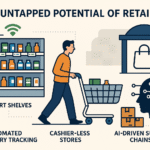
In essence, the application of artificial intelligence in retail and beyond is an aspect of computer science that seeks to improve software’s ability to interpret its surroundings.
This is achieved through the use of established rules and algorithms or machine learning models capable of recognizing patterns, subsequently making informed decisions based on these assessments.
Such solutions include automated inventory control, demand forecasting, customer service, predictive analytics, and more, all of which are aimed at enhancing retail operations.
Machine learning assists in predicting inventory, demand, and supply by not relying solely on historical data.
The technology, instead, anticipates what items will be in demand, facilitating improved forecasts based on real-time data including demographics, weather conditions, performance of similar items, and even online reviews and social media.
Predictions can be tailored by store, SKU, size, color, among other criteria.
Category management, a discipline that has always been essential for retailers and their CPG manufacturer suppliers, is undergoing a significant transformation due to digitalization.
While the eight steps of the category management process have remained constant, the approach to the process is being disrupted through vast amounts of transactional data, customer loyalty data, advancements in hardware technology like superior scanners, image recognition devices, sensors, IoT devices, machine learning, and artificial intelligence.
Let’s focus on computer vision for a moment and consider the various tasks performed by category managers at retail chains.
Their responsibilities include supplier negotiations, internal communications with analysts and other managers, market and competition analysis, procurement management, demand planning, and pricing.
These responsibilities underline the range of tasks performed by category managers.
Can all these processes be completely managed by artificial intelligence in retail?
Picture an AI-driven solution capable of defining category objectives, analyzing market performance, and then negotiating with suppliers for desired products at optimal terms.
It’s unlikely that any machine could perform all these tasks simultaneously as effectively as a human.
However, any category manager knows that these strategic processes and tasks are just one aspect of the job.
Managers have to collect, process, and analyze large amounts of data, and undertake many routine tasks related to strategy execution. This is where AI comes into play.
In terms of data analysis, operations automation, and analytics-based decision making, AI outperforms humans.
This allows category managers to concentrate on truly important strategic goals.
Automated category management plays a critical role, and the influence of machine learning in this area cannot be overlooked.
Modern technologies make the implementation of AI or artificial intelligence in retail quite tangible and concrete. Examples include:
Recommender systems:
AI-powered recommender systems are used by many online retailers to suggest products to customers based on past purchases, browsing history, and search queries.
Personalization:
Retail companies are using AI to tailor the shopping experience for their customers.
AI helps create personalized product recommendations, targeted marketing campaigns, and customized search results.
Inventory management:
AI assists retailers in managing their inventory more efficiently by predicting demand for specific products and automatically reordering inventory when necessary.
Fraud detection:
Retail companies are employing AI to detect fraudulent transactions and safeguard customers’ payment information.
AI algorithms can analyze vast amounts of data to identify unusual patterns and flag potential fraud.
Customer service:
AI-powered chatbots and virtual assistants are employed by many retailers to provide quick and efficient customer service.
In retail inventory management, AI algorithms can analyze sales data, customer behavior, and other factors to predict demand for specific products, optimizing inventory levels and automating reordering processes.
This improves the accuracy and efficiency of inventory management processes, leading to improved customer service and increased profits.
In terms of retail inventory tracking, AI-powered systems can track inventory in real-time, automate the tracking process, and predict future demand.
Inventory visibility provided by AI can help retailers identify bottlenecks and inefficiencies in their inventory management processes, leading to improvements.
AI can utilize technologies such as computer vision, RFID (radio-frequency identification), and barcode scanners for tracking retail inventory.
Computer vision uses cameras and specialized algorithms to automatically identify and track items in a retail setting.
This can be merged with machine learning techniques for constant system improvements regarding accuracy and efficiency over time.
Other technologies like RFID and barcode scanners can be used to swiftly and accurately identify and track items throughout the supply chain.
AI has a multitude of applications in retail operations. Some common uses include:
Inventory management:
AI can monitor inventory levels and automatically reorder items when they hit a certain threshold.
This capability can help retailers avoid stock-outs and overstocking, saving money and improving customer satisfaction.
Customer service:
AI can provide personalized recommendations and assistance to customers, such as through chatbots or virtual assistants.
This can enhance the customer experience and help retailers deliver more efficient and effective support.
Pricing optimization:
AI can examine market data and customer behavior to ascertain optimal pricing for products and services.
This can help retailers maximize profits and stay competitive in the market.
Fraud detection:
AI can identify fraudulent transactions and prevent losses from fraudulent activity.
This is done through the use of machine learning algorithms that can analyze transaction data and identify patterns indicative of fraud.
The implementation of AI in retail operations can aid retailers in enhancing their efficiency, profitability, and customer satisfaction.

















































































